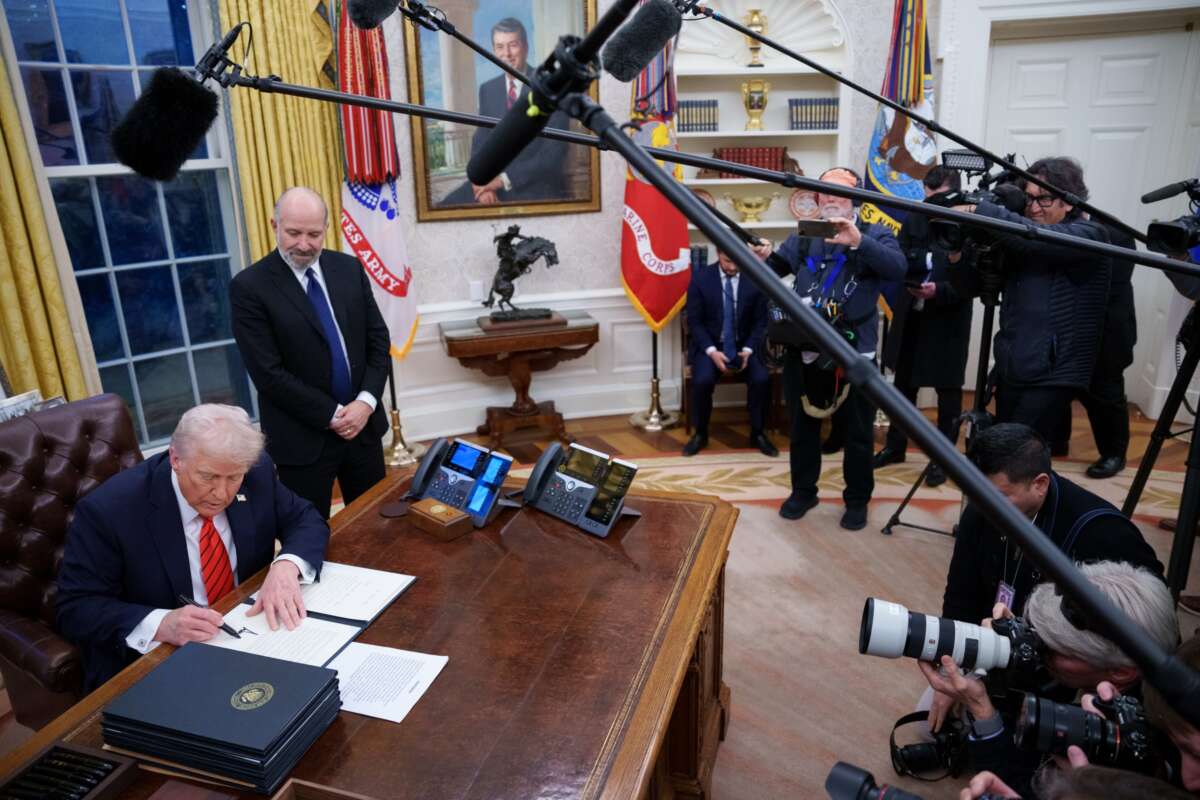Support justice-driven, accurate and transparent news — make a quick donation to Truthout today!
The Trump administration revoked Associated Press reporters’ access to a White House event this week after officials demanded that the publication change an editorial standard in compliance with a President Donald Trump order — a chilling instance of censorship that violates constitutional rights, the publication said.
In a statement, AP Executive Editor Julie Pace said that the Trump administration blocked the publication from an Oval Office event and executive order signing on Tuesday.
This was done in retaliation for the publication not complying with the Trump administration’s demand that it change its editorial standards to align with Trump’s order to rename the Gulf of Mexico to “Gulf of America.” The name change has not been recognized by other countries, including Mexico.
“It is alarming that the Trump administration would punish AP for its independent journalism,” Pace said. “Limiting our access to the Oval Office based on the content of AP’s speech not only severely impedes the public’s access to independent news, it plainly violates the First Amendment.”
Later that day, the White House barred another AP reporter from an evening event in the White House’s Diplomatic Reception Room. An AP article on the incident called this “highly unusual.”
Shortly after Trump signed the “Gulf of America” order on his first day in office, AP issued guidance saying that the publication “will refer to it by its original name while acknowledging the new name Trump has chosen.”
“Trump’s order only carries authority within the United States. Mexico, as well as other countries and international bodies, do not have to recognize the name change,” the publication said. “As a global news agency that disseminates news around the world, the AP must ensure that place names and geography are easily recognizable to all audiences.”
In the same notice, the publication said that it would be changing future references to Denali, in Alaska, to Mount McKinley, in compliance with a Trump order to erase the name used by Alaska Natives and to instead recognize President William McKinley.
Trump signed an order on Tuesday directing agencies to comply with Elon Musk’s Department of Government Efficiency (DOGE) as it hacks and slashes its way across the federal government. Musk was present at the signing.
Access to these events allows press to report accurately on statements by officials, and to ask questions as officials make themselves available to journalists for comment. At the signing on Tuesday, for instance, Musk answered a number of questions about his role in the government as he conducts his administrative coup.
The White House Correspondents’ Association raised alarm about the AP ban.
“The White House cannot dictate how news organizations report the news, nor should it penalize working journalists because it is unhappy with their editors’ decision,” the group’s president, Eugene Daniels, said in a statement. “The move by the administration to bar a reporter from The Associated Press from an official event open to news coverage today is unacceptable.”
Trump is silencing political dissent. We appeal for your support.
Progressive nonprofits are the latest target caught in Trump’s crosshairs. With the aim of eliminating political opposition, Trump and his sycophants are working to curb government funding, constrain private foundations, and even cut tax-exempt status from organizations he dislikes.
We’re concerned, because Truthout is not immune to such bad-faith attacks.
We can only resist Trump’s attacks by cultivating a strong base of support. The right-wing mediasphere is funded comfortably by billionaire owners and venture capitalist philanthropists. At Truthout, we have you.
We’re in the midst of a fundraiser, and as of right now, we have until midnight to raise $10,000. Please take a meaningful action in the fight against authoritarianism: make a one-time or monthly donation to Truthout. If you have the means, please dig deep.
